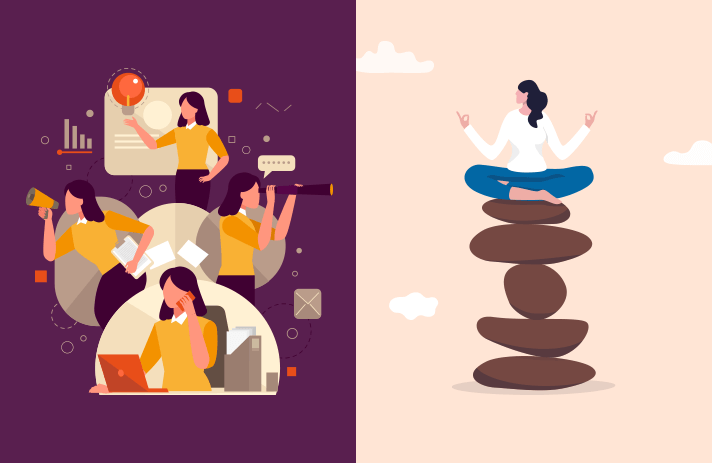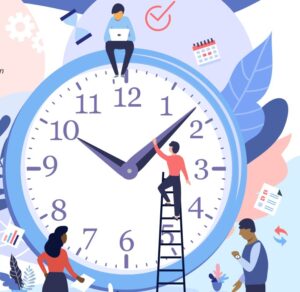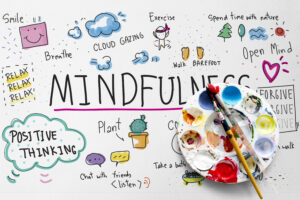
We live in an era where you must show extraordinary professional skills. You are supposed to perform maximum tasks with the highest accuracy and quality. But all these cannot be achieved simultaneously. You can do multiple jobs that show your skills and adaptability, or you must do one task at a time if you do not want to compromise on quality. People are still confused to choose which is best; mindfulness or multitasking. This blog will help you choose the better one while comparing the pros and cons. But before going into this comparison, let us discuss multitasking and mindfulness and their pros and cons.
What Is Multitasking?
Multitasking refers to the performance of more than one task at the same time or simultaneously. During multitasking, you have to manage numerous responsibilities together. You have to switch between the tasks immediately and maintain accuracy and achieve the goals. Multitasking has its pros and cons, which are given here:
The Main Aspects of Multitasking:
Multitasking helps to enhance the production and quantity of the work when you do more in less time. Different aspects of multitasking include:
- Being active
- Being motivated
- Being more productive
- Switching between the tasks when needed
- Working with different mindsets at a time
Pros Of Multitasking:


Multitasking increases your credibility and makes you more confident about doing different tasks simultaneously. The variety of minds has shown different results after being engaged in multitasking. Some of the positive impacts of multitasking may include:
Gives Mental Stimulation – Following the same schedule with a single task at a time may reduce your enthusiasm. You may have learned the functions and have to repeat them daily. Multitasking helps you work better under pressure and provides you with mental stimulation. During multitasking, you must keep switching between multiple tasks that stimulate your brain.
Increases Production – Multitasking can increase your production when you complete more than one task simultaneously. But the tasks assigned to you must be simple. It is a good approach for those with tight deadlines and multiple projects. You do not need to share significant mental effort during multitasking.
Reduces Boredom – Doing a single task for an extended period or daily routine hours can lead you to boredom, and you may struggle to focus on your goals. Since your mind is engaged in multiple tasks simultaneously while multitasking, it can help reduce boredom and keep you busy.
Breaks Up Your Routine – Multitasking can help you break up your routine in a repetitive style. While doing multiple tasks at a time, you are engaged in each task with a different mindset that helps you learn something new in a new way.
Enhances Your Adaptability – Working with different mindsets while multitasking, you go through other circumstances. It makes your mind move constantly from one thing to another while adapting to the changes. You become capable of facing challenges.
Helps You Avoid Procrastination – Procrastination refers to the act of voluntarily delaying or postponing something until the last moment of the deadline. When you have more than one task, you usually make a list while arranging it according to the deadlines but usually face difficulty doing it. While multitasking, you can avoid procrastination as you prepare to do more than one task at a time.
You Can Work Through Distractions – In the present era, we can frequently face a scenario where we have different tasks to do with a shortage of time. While doing a single job, we suddenly have to do another task. If you are an expert in multitasking, you can work through distractions.
Improves Your Brain Power – As your body can do more work with high energy to perform different tasks, your brain demands staying active and fit. Multitasking enhances your brain power and makes you more energetic.
Cons Of Multitasking:


Multitasking can produce much more than doing a single job but it has some flaws as well. Research shows that multitasking lowers your IQ, shrinks the gray matter and lowers your productivity by 40%. The drawbacks associated with multitasking include:
Mental Exhaustion – During multitasking, you deal with various tasks and require different mindsets to perform them effectively. It will lower your energy levels and can lead to mental exhaustion. A high level of mental fatigue can ultimately cause stress and anxiety.
Can be Less Productive – Although multitasking can increase production within a specific time duration, it can also make it less productive for you. You have to switch between the tasks and may have to leave an important one behind to complete one that is easier. It can cause distractions for you, and your productivity decreases.
Reduced Quality of Work – One of the most significant disadvantages of multitasking is the reduced quality of work or service. When your abilities and skills are divided into multiple tasks, producing something with the highest quality would be impossible. Going from one task to another in milliseconds can create the possibility of mistakes. These mistakes can reduce the quality of your work.
Increases Stress Levels – Despite many benefits in enthusiasm, mental stimulation, and adaptability, multitasking can increase stress levels. It happens when you have to work in an atmosphere that creates high pressure. You have to think about multiple tasks at a single moment and engage yourself in all of them. Your workload increases, which causes stress for you, ultimately leading to bad mental health.
Reduced Energy Levels – You will feel less energy when you have to deal with more tasks and have less time to finish them. You struggle to concentrate on the functions and feel irritable. Your focus and attention are divided, and your mental state would not be good enough to do everything simultaneously. This additional stress decreases your energy level.
Reduced Motivation and Enthusiasm – Multitasking may motivate you to be adaptive and enthusiastic in your work, but it can reduce your motivation when performed regularly. When indulged in more than one task, you may likely finish a job a bit late due to the division of time and attention to other tasks. The results can demotivate you. Multitasking puts a lot of pressure on you, which reduces the positive reinforcement you get by completing the task. It decreases your morale. It can harm other activities and your health as well.
Affects Your Creativity and Memory – Multitasking and creativity can’t work together. You should do a task with total concentration and focus to be creative. Multitasking inhibits you from learning anything new that you can do while doing a single work. It can also decrease your memory level when you cannot focus on everything. You can’t remember everything related to all the tasks assigned to you at a single moment.
What is Mindfulness?
Mindfulness refers to the cognitive skill of focusing on the present moment and being aware of what is in front of you. It is a state of mind and can be developed with meditation or other training. This practice improves your attention, reduces stress, and increases productivity.
The Main Aspects of Mindfulness:
Mindfulness is a skill currently being learned and implemented by several companies and their employees to enhance the productivity and quality of products or services. It assures you more comprehensive results when we talk about the different aspects of mindfulness. These may include: 

- Being aware
- Being attentive
- Being non-judgmental
- Focusing on what is in front of you
- Following a “one thing at a time” mindset
Pros of Mindfulness:
Mindfulness offers you mental relaxation and lets you recognize yourself more clearly. The advantages you get from mindfulness include:
Increases Self-Awareness – Self-consciousness is one of the greatest advantages of mindfulness. During mindfulness, you know what you are experiencing and can choose what is better for you and what is not. It lets you recognize your skills, potential, and the possibilities around you. You become aware of the negative or unhealthy pathways and try to improve yourself. You can build up healthier habits to have the best results of your efforts.
Makes You Non-Judgmental – Mindfulness helps you to be non-judgmental. Naturally, your thoughts may wander when you do a task or converse with someone. You do not have to choose from different matters or things and maintain your focus. You can be attentive, aware of your emotions, and less judgmental.
Better Decision-Making and Management – One of the most significant advantages of mindfulness is that it helps you make better decisions and improve management. Knowing what is happening around you makes it easier to respond accordingly and effectively. It makes you less judgmental and more confident in what you do or plan to do.
Makes You More Confident – Being mindful makes you more confident. You build trust in yourself and improve your skills. Your confidence grows, giving you the potential to do better and more.
Better Emotional Health – When you practice mindfulness in your daily routine, it can improve your emotional health. Better emotional health can lead to improved mood, sense of well-being, and self-awareness. It can eventually lead to better relationships and improved behaviors.
Helps You Avoid Distractions – You avoid distractions while focusing on a single task at a single moment. During the job, your mind may wander between your thoughts, but mindfulness helps you return to work. It will also assist you in utilizing your abilities more precisely.
Makes You Satisfied and More Committed – Mindfulness gets you more satisfied and committed to your duties. When you implement all your abilities over the task, the quality of your work is enhanced. You are more satisfied emotionally and professionally. You get more committed to your duties and try your best to get the best out of it.
Increases performance and productivity – Being mindful can enhance your performance. There are fewer chances to get distracted while following a linear line of thinking. Once you do a task with complete focus for a more extended period, it increases your learning ability; the next time, you can do it quickly. It also enhances your productivity. You get to know the task you have to prioritize, and it helps you choose the important one. It decreases your stress, which eventually increases productivity.
Increases Clarity and Focus – Mindfulness lets you see things more precisely and clearly. It enhances your focus and helps you make better decisions. You are well aware of your environment, the present moment, and the possible opportunities to get the best results.
Reduces Stress and Anxiety – Mindfulness helps in reducing the stress and anxiety that could be generated by multitasking. While doing a single task, you’ll have the ability and time to take the best steps. Your worries and negative thoughts will be eliminated. You will be free from stress or anxiety related to the task when you have all the knowledge to resolve your issues.
Improves Quality of Life – Mindfulness improves your quality of life when you feel relaxed and focused. You can make better decisions and perform your task in a better way. However, multitasking gets you stuck between different matters while switching between tasks. It can affect your mental as well as physical health.
Reduces Your Overwhelm – You become overwhelmed when you are involved in multiple tasks at a single moment. Mindfulness helps you focus only on essential tasks and leave the rest for later. It also minimizes your distractions and relaxes your mind.
Cons of Mindfulness:
Mindfulness has an edge over multitasking, but it still has some disadvantages. It depends on the environment, scenario, and some other factors. Some of the disadvantages of mindfulness include:


Time-Consuming Process – The most highlighted disadvantage of mindfulness is that it needs more time to complete fewer tasks. Moreover, this skill can only be developed slowly and requires learning time and patience. The most utilized approach to develop this skill is the “trial and error method”. You must dedicate a specific time daily to meditate, reflect, explore your emotions, and achieve your goals.
It Can Be Frustrating – When you follow mindfulness, it can be frustrating for you initially. It may happen when you find it difficult to focus or have been doing multiple tasks simultaneously. It may sometimes give you mental exhaustion as well. This frustration can be reduced after you practice it over time.
Needs more Discipline – Life has become fast-paced, and it’s becoming more and more difficult. If your life is organized, it would be possible for you to be mindful. You have to be more disciplined to have mental relaxation and satisfaction. You would be focused on the present moment and complete your tasks efficiently.
Can Lead To Procrastination – If you practice mindfulness in your daily life, it can lead to procrastination as well. Thinking about your actions, emotions, and surroundings can force you to slow down in a process or complete the task at an average pace.
Mindfulness Or Multitasking – Which Is Better?
When you have to choose between multitasking or mindfulness, it is not simple to say which is better. It depends on your abilities, the environment’s demands, and many other factors. Despite their advantages and disadvantages, mindfulness is better than multitasking. This clear-cut edge of mindfulness over multitasking is due to the more benefits you get from mindfulness.
Why Mindfulness is Considered Better Than Multitasking?


Although multitasking and mindfulness both have their pros and cons. However, due to more benefits and according to different research studies, mindfulness is considered better than multitasking. There are multiple reasons for this edge mindfulness has over multitasking. Some of the reasons include:
Improves Your Concentration – Mindfulness helps you concentrate and focus on a task you are doing right now and lets you utilize all your intelligence and senses. It enhances your focus and decreases the distractions. However, multitasking divides your focus and attention between different tasks. You are unable to concentrate on the task you are doing. You should practice mindfulness to stay focused.
Increases Productivity – Mindfulness has proven to be more productive for people. It helps you recognize actions, feelings, thoughts, and surroundings. Although multitasking enables you to do more tasks simultaneously, it is only more productive for some. Due to different mindsets and divided perceptions, it can decrease your productivity. You cannot focus on a single task that demands great attention. According to some research studies, multitasking can reduce your productivity by up to 40%.
Let You Connect With Yourself – Mindfulness lets you connect with yourself. You are well aware of your actions, emotions, and your surroundings. It gives you enough time to be within yourself. You have the time to check your energies, demands, and emotional needs. With mindfulness, you can make accurate decisions while multitasking juggles you between different tasks, forcing you to do one task after another.
Reduces Stress And Anxiety – During multitasking, you are indulged in handling too many tasks simultaneously. It can hurt your physical as well as mental health. Conversely, mindfulness reduces the anxiety or stress you could face while multitasking. It helps you relax and lets you focus on your goal. You deal with a single task or action at a single time, which eventually lessens the stress related to the overwhelmed condition of your brain during multitasking.
Makes You Creative – Doing different tasks with different mindsets and multitasking can decrease your creative mindset. Mindfulness makes you more creative when focused on your surroundings and limited to a single task. It allows your mind to relax and explore different possibilities or solutions to your problems.
Improves Your Memory – While observing mindfulness, you are engaged with a thing or task for a longer time, enabling you to memorize the information more effectively. But during multitasking, you indulge in an item or task for the short term, which lessens your ability to remember the data for a long time. You have to switch between the tasks immediately and need help remembering the information related to every job.
Raise Your Decision-Making Power – Another advantage of mindfulness over multitasking is that it boosts your decision-making power. You can think more rationally and logically while focusing on a single task. During mindfulness, you are conscious of your actions, emotions, and thoughts and present in the moment, which eventually helps you make the best decision. However, during multitasking, you need to work on your attention, which makes you unable to make the best decision possible.
Final Thoughts:
Mindfulness and multitasking both have their advantages and disadvantages. You can use mindfulness or multitasking strategies depending on your abilities and goals. However, mindfulness has a clear edge over multitasking. You are fully present and aware of the surroundings. It proves to be more productive and improves your potential to do more. It also lets you focus on the tasks assigned vigilantly.
FAQ: Mindfulness Or Multitasking: Which One Is Better For You?
1.What is mindfulness, and how does it differ from multitasking?
Mindfulness is the practice of being fully present and engaged in the moment, without judgment or distraction. It involves paying deliberate attention to one task or experience at a time. On the other hand, multitasking refers to the attempt to perform multiple tasks simultaneously or rapidly switch between tasks.
2.What are the benefits of practicing mindfulness?
Research suggests that mindfulness can lead to reduced stress, improved focus and concentration, enhanced emotional regulation, and greater overall well-being. It can also foster better decision-making and problem-solving abilities.
3.What are the drawbacks of multitasking?
While multitasking may seem like a productivity booster, it often leads to decreased efficiency, increased errors, and higher levels of stress. Constantly switching between tasks can also impair cognitive functions and diminish the quality of work.
4.How does mindfulness affect cognitive function?
Studies have shown that regular mindfulness practice can enhance cognitive functions such as attention, working memory, and cognitive flexibility. By training the brain to focus on one task at a time, mindfulness can improve overall cognitive performance.
5.Does multitasking affect brain health?
Research indicates that frequent multitasking may negatively impact brain health over time. It can lead to cognitive fatigue, decreased grey matter density in certain brain regions, and impairments in memory and attention.
6.Can mindfulness improve workplace productivity?
Yes, incorporating mindfulness practices in the workplace has been linked to increased productivity, better decision-making, and enhanced collaboration among team members. Mindful employees tend to be more engaged, creative, and resilient in the face of challenges.
7.How can individuals develop mindfulness skills?
Mindfulness can be cultivated through various techniques such as meditation, deep breathing exercises, body scan practices, and mindful movement (e.g., yoga or tai chi). Consistent practice and patience are key to developing mindfulness skills.
8.Is it possible to multitask effectively?
While some individuals may believe they are proficient multitaskers, research suggests that true simultaneous multitasking is a myth. The brain can only focus on one task at a time, so attempting to juggle multiple tasks usually results in decreased efficiency and increased errors.
9.How does mindfulness impact stress levels?
Mindfulness has been shown to reduce stress by promoting relaxation, regulating emotions, and fostering a sense of present-moment awareness. Mindful individuals are better able to cope with stressors and manage their responses to challenging situations.
10. Which approach is more conducive to a balanced lifestyle: mindfulness or multitasking?
In general, prioritizing mindfulness over multitasking is more likely to contribute to a balanced and fulfilling lifestyle. By focusing on one task at a time and being fully present in each moment, individuals can cultivate a sense of purpose, fulfillment, and inner peace, leading to greater overall well-being.

